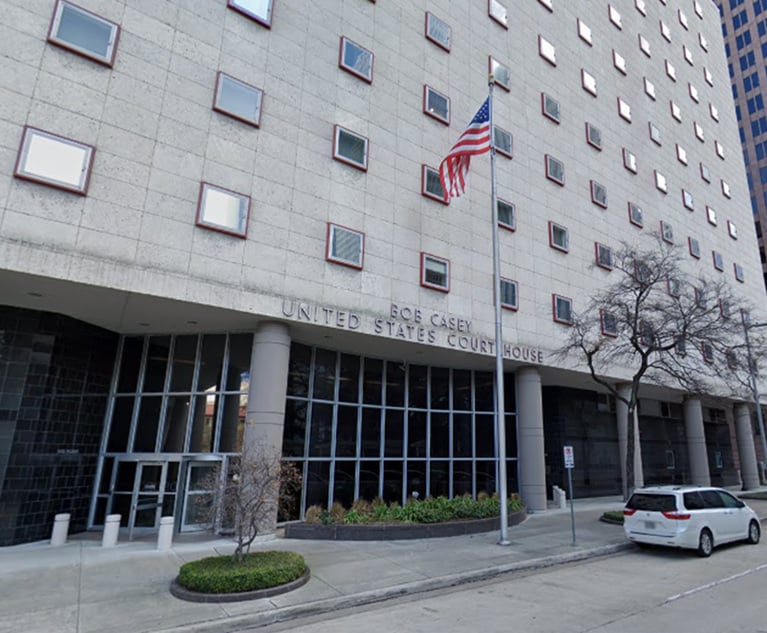The Last Frontier: the Promise of AI-powered Legal Analytics in Texas
As one of the last frontiers for big data, legal tech is still in its infancy. AI-powered legal analytics is working its way into every aspect…
July 13, 2020 at 05:23 PM
6 minute read
 Nicole Clark is the CEO and co-founder of Trellis Research. (Photo: Courtesy Photo)
Nicole Clark is the CEO and co-founder of Trellis Research. (Photo: Courtesy Photo)As one of the last frontiers for big data, legal tech is still in its infancy. AI-powered legal analytics is working its way into every aspect of the legal industry. It has helped litigators sort through thousands of pages of discovery documents. It has also helped litigators gain strategic insights into the way a judge rules or an opposing counsel argues. When combined, the promise of AI-powered legal analytics is undeniable, offering litigators unprecedented tools for the development of case strategies.
High-Tech Legal Research
The State of Texas is widely known as an electronics leader. Since the 1950s, Texas Instruments and other high-tech companies transformed the region into a key technology hub for the United States. It is unsurprising, then, to find legal analytics spread across the state, deployed throughout the offices of large and small law firms.
Legal analytics is not new. Many litigators have used technology to conduct legal research in their day-to-day legal practice for years. This research has relied on electronic databases (think: Westlaw), a research practice that is not dramatically different from the kind of research conducted in law libraries. Things change, however, when these electronic databases align with new forms of artificial intelligence, softwares that can search for and extract data that is similar to a user's inquiry.
Consider, for example, MacKenzie Dunham, an attorney who operates Access Justice Houston, a "low bono" law firm in Texas. Dunham describes a challenging sexual assault case, one that required him to search through multiple sources of case law to locate an authoritative definition of reasonable grounds to believe. After unsuccessfully combing through secondary sources and utilizing conventional search methods, he eventually tried Casetext's Case Analysis Research Assistant (CARA), an AI-powered legal research tool that uses latent semantic analysis to identify patterns in legal documents. In a matter of seconds, CARA provided Dunham with "a U.S. Supreme Court case analyzing what a 'reasonable ground' meant and comparing it to probable cause."
These powerful search platforms enable users to answer legal questions with incredible speed and accuracy. Jeff Price, a Dallas-based attorney with Quilling, Selander, Lownds, Winslett & Moser, reflects on his use of ROSS Intelligence. "I recently worked on a project to determine the best damages model for a trademark infringement case. With the help of ROSS, I quickly found several cases that had analogous fact patterns. It also identified cases that provided additional grounds for the recovery of damages that I hadn't previously considered."
Smarter, Faster Document Production
Legal analytics platforms can do much more than search. They can also build. Across the State of Texas, immigration attorneys have utilized automated technologies and natural language processing to make immigration services more accessible and more affordable. These products deploy "complex conditional logic to help people prepare the paperwork and documents they need for an immigration filing."
To give an example, Berry Appleman & Leiden, a global immigration law firm with offices in Austin and Houston, uses open-source software libraries like TensorFlow, PyTorch, and Tesseract OCR. Using its repository of immigration law data, the firm trains AI systems to spot patterns. The firm then uses artificial intelligence "to extract information from documents and draft responses to certain common government requests [they] frequently handle for corporate clients." As one of its managing partners explains, "[w]hen the law firm receives a [government request for evidence], its systems can read the letter, interpret what it is requesting, search a library for potential responses, and then draft a response based on what was said."
Another firm, Ogletree Deakins Nash Smoak & Stewart, partnered with LegalMation, a legal tech company that provides a web-based AI tool that automatically generates litigation documents. An attorney uploads a PDF document into the website, which then translates the PDF into text, analyzes its contents, and generates a relevant draft response. According to the firm's chief knowledge officer, the tool shrinks six to eight hours of work into two minutes, saving the firm time and money. The firm then shares these savings with their clients, charging a fee for the technology while also reducing the number of billable hours charged to the client. This equates to roughly $3,000 in savings per case. It also allows attorneys to be more strategic and less tactical, explains Ron Chapman, Jr., a Dallas-based shareholder at Ogletree.
A New Legal Landscape
Even with all of these advances, the adoption of AI-powered legal analytics has been slow. There are skeptics, with even its proponents acknowledging its limitations. Michael Smith, a patent infringement litigation attorney with Siebman, Forrest, Burg & Smith in Sherman, warns that predictive analytics can never tell you the whole story. Judicial analytics, for example, "many tell you more about the types of cases [in the dataset] than it does the judge's predispositions. I repeatedly have to caution people that their opponent is not the judge's tendencies or prior rulings, but the facts of the case."
These warnings are a reminder that legal tech may be a new, uncharted territory. It is, nevertheless, here. The attorneys who have embraced these new technologies are moving fast, helping them manage every aspect of the litigation process at incredible speeds and with incredible efficiencies.
Nicole Clark is the CEO and co-founder of Trellis Research and a business litigation, labor and employment attorney. Trellis is an AI-powered legal research and analytics platform that gives state court litigators a competitive advantage by making trial court rulings searchable, and providing insights into the patterns and tendencies of your opposing counsel, and your state court judges. Trellis is providing Texas Lawyer readers complimentary 14-day access to its platform. Click here to start your free trial today.
This content has been archived. It is available through our partners, LexisNexis® and Bloomberg Law.
To view this content, please continue to their sites.
Not a Lexis Subscriber?
Subscribe Now
Not a Bloomberg Law Subscriber?
Subscribe Now
NOT FOR REPRINT
© 2025 ALM Global, LLC, All Rights Reserved. Request academic re-use from www.copyright.com. All other uses, submit a request to [email protected]. For more information visit Asset & Logo Licensing.
You Might Like
View All

Conspiracy Suits Against Quinn Emanuel, Roc Nation Moved to Federal District Court

JCPenney Seeks Return of More Than $1.1M From Jackson Walker For Bankruptcy Work
3 minute read
Ex-Appellate Court Judges Launch Boutique Focused on Plaintiffs Appeals
2 minute readLaw Firms Mentioned
Trending Stories
Who Got The Work
J. Brugh Lower of Gibbons has entered an appearance for industrial equipment supplier Devco Corporation in a pending trademark infringement lawsuit. The suit, accusing the defendant of selling knock-off Graco products, was filed Dec. 18 in New Jersey District Court by Rivkin Radler on behalf of Graco Inc. and Graco Minnesota. The case, assigned to U.S. District Judge Zahid N. Quraishi, is 3:24-cv-11294, Graco Inc. et al v. Devco Corporation.
Who Got The Work
Rebecca Maller-Stein and Kent A. Yalowitz of Arnold & Porter Kaye Scholer have entered their appearances for Hanaco Venture Capital and its executives, Lior Prosor and David Frankel, in a pending securities lawsuit. The action, filed on Dec. 24 in New York Southern District Court by Zell, Aron & Co. on behalf of Goldeneye Advisors, accuses the defendants of negligently and fraudulently managing the plaintiff's $1 million investment. The case, assigned to U.S. District Judge Vernon S. Broderick, is 1:24-cv-09918, Goldeneye Advisors, LLC v. Hanaco Venture Capital, Ltd. et al.
Who Got The Work
Attorneys from A&O Shearman has stepped in as defense counsel for Toronto-Dominion Bank and other defendants in a pending securities class action. The suit, filed Dec. 11 in New York Southern District Court by Bleichmar Fonti & Auld, accuses the defendants of concealing the bank's 'pervasive' deficiencies in regards to its compliance with the Bank Secrecy Act and the quality of its anti-money laundering controls. The case, assigned to U.S. District Judge Arun Subramanian, is 1:24-cv-09445, Gonzalez v. The Toronto-Dominion Bank et al.
Who Got The Work
Crown Castle International, a Pennsylvania company providing shared communications infrastructure, has turned to Luke D. Wolf of Gordon Rees Scully Mansukhani to fend off a pending breach-of-contract lawsuit. The court action, filed Nov. 25 in Michigan Eastern District Court by Hooper Hathaway PC on behalf of The Town Residences LLC, accuses Crown Castle of failing to transfer approximately $30,000 in utility payments from T-Mobile in breach of a roof-top lease and assignment agreement. The case, assigned to U.S. District Judge Susan K. Declercq, is 2:24-cv-13131, The Town Residences LLC v. T-Mobile US, Inc. et al.
Who Got The Work
Wilfred P. Coronato and Daniel M. Schwartz of McCarter & English have stepped in as defense counsel to Electrolux Home Products Inc. in a pending product liability lawsuit. The court action, filed Nov. 26 in New York Eastern District Court by Poulos Lopiccolo PC and Nagel Rice LLP on behalf of David Stern, alleges that the defendant's refrigerators’ drawers and shelving repeatedly break and fall apart within months after purchase. The case, assigned to U.S. District Judge Joan M. Azrack, is 2:24-cv-08204, Stern v. Electrolux Home Products, Inc.
Featured Firms
Law Offices of Gary Martin Hays & Associates, P.C.
(470) 294-1674
Law Offices of Mark E. Salomone
(857) 444-6468
Smith & Hassler
(713) 739-1250






